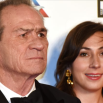Music Times writers share an office area of roughly 45 sq. ft, which makes having face-to-face conversations totally impossible. Junk Mail is these millenials attempt to discuss and review the week's hottest album releases... without needing to look at each other.
This week: Ryan Book, Caitlin Carter and Carolyn Menyes email back and forth about John Frusciante's Enclosure.
Ryan Book: The most noticeable thing from Enclosure was the lack of guitar. Frusciante isn't exactly Ace Frehley, but at some point you expect a solo album from the renowned guitarist to highlight that instrument. He took some time to noodle on the instrumental track "Cinch," but the density and aggression of percussion and drums on Enclosure was the focal point for me. This isn't necessarily a complaint, as guitarists tend to overdose...Tom Morello described his upcoming solo spot as "the craziest guitar record anyone's ever heard," and that scares the hell out of me.
Caitlin Carter: That was one of the first things I noticed as well. I waiting for fancier guitar work, but as you said, the focal point on this album is drums -- and a drum machine nonetheless. The drumming is sporadic throughout the record -- sometimes it works but most of the time it seems excessive and distracting. I feel like if he would have stripped down some of the tracks with minimal synth and more targeted drum sections it would have felt less chaotic. That said, chaotic is probably what he was going for in this "musical investigation," and his chaos isn't really indulgent or anything but it distracts from his true talent. I think it would almost be better to listen to this album without thinking of it as a Frusciante record...
Carolyn Menyes: Yeah, immediately listening to this, it did not connect to me that this was the same John Frusciante who was in the Red Hot Chili Peppers... without really thinking about it, this seemed like some experimental PBR&B record, not something from a prominent rock guitarist. In his defense, this is an unexpected effort. If he just came out shredding with funky basslines, what would there be to really talk about?
As for the guitars, "Cinch" is pretty heavy on the instrument -- that's the kind of song I feel like we were expecting here. But, somehow, it's also my least favorite song on the album. It really drags. Maybe it's the inherent indie pop fan in me, but I am not about that guitar solo life.
CC: I definitely wasn't expecting an RHCP rip-off album seeing as his past solo releases were also pretty experimental and on the dark electronic spectrum. He did say in the press release leading up to the album dropping that this was his "last word on the musical statement that began with PBX." I'm just trying to figure out what he was trying to say. I think it will take a few listens to grasp the "concept" he was going for...be that a lyrical concept or a "musical" concept.
CM: Fair. I'm obviously just showing my ignorance here, I've never bothered to listen to John Frusciante before this email chain review, and it's not the kind of thing I would have ever sought out on my own, as both a music fan and journalist. I went back and listened to clips of some of his older music on Spotify, and even still, this album feels a little out of left field. I'm sure there has to be a lyrical theme of some sort -- you don't make this kind of music unless you're looking to make a statement. But it's hard to focus on that over ALL DAT SYNTH.
RB: In terms of the somewhat spastic nature of the drums and synth, I'd argue for it. Frusciante made it clear that Enclosure would be more experimental than his previous releases. I picked up a somewhat Tago Mago era CAN vibe here. Of course, CAN is also a full band. And of course, CAN vocalist Kenji Suzuki had the range to fly around willy nilly with his band. Frusciante's vocal strongpoint is his marvelous falsetto, but his delivery is too straightforward not to get lost in the wind on this album. I'll have to do some Garage Band editing, but I'm willing to bet that Enclosure would be a much better listen sans vocals. Trying to catch the lyrics just distracts.
CC: Yeah, I would be interested to hear this album sans vocals as well. As Carolyn mentioned, the lyrics get lost in all the other elements. I couldn't recite one memorable line off the Enclosure, but seeing as it's not a pop-sensible album, I wouldn't expect to. I probably need to listen to Black Knights' Medieval Chamber considering he was working on their album simultaneously. To quote his press release again, he said that the two albums "represent one investigative creative thought process."
CM: So, are we going to kind of put the vocals into Sigur Ros "this is just another instrument" category? Because that's something I can understand, and that's something that would make a little more sense for such an experimental album. And I would say with where they are in the mix, that has to be the purpose here. When you look at each song as one whole piece instead of the sum of its parts, it makes for a really engrossing sonic experience. This isn't the kind of thing I'd want to listen to again, but as I think about it more, it's not as bad as I thought, even if it's not immediately accessible.
RB: Haha. I'm not going to give him the benefit of the doubt with regards to "the voice as an instrument." That's usually bulls--t faux-intelligentsia when bands make that argument. No kidding the voice is "an instrument"...IT'S PART OF A SONG. Frusciante thankfully didn't try to explain his lyrics and/or vocalizations as overly strategic, so I don't have to criticize him for being a highbrow wannabe. But nonetheless, the vocals here don't make any impact or play any semblance of a role here. The "art" here is in the instrumentals and instrumentals alone. The lyrics are just "it's-a-sad-world" tropes such as "waiting for the sun to never change" (from "Fanfare). I really hate when instrumentalist solo projects, i.e. Slash's, are just a revolving door of guest vocalists, but Frusciante could have used some help. My knee-jerk reaction is Katie Stelmanis from Austra. That's an instrumental voice.
CC: I understand the "voice as an instrument" argument, but in this case, it was "an instrument" that didn't really add to the rest of the elements. I suppose it did keep continuity among songs though, as his voice sounds arguably the same on each track save a few falsetto moments.
CM: I agree, Caitlin. And I meant the voice as an instrument more as "the voice is another element in the mix not necessarily the carrier of a message" thing. He's not trying to tell a straight-up story in any of these songs, like in the folk tradition or whatever. Slash's album was messy, in my opinion, so I like the consistency of keeping all the instruments, voice included, consistent throughout the album. It helps to make it one bigger piece. Obviously this is an album-album and not a collection of singles.
FINAL THOUGHTS:
RB: Kudos for ambition, but it's overkill on Enclosure. Frusciante relies on electronic elements less than he did on 2012's PBX Funicular Intaglio Zone, but the results were just as messy. Maybe the guitarist finds his work such as 2009's Empyrean too straightforward, too guitar-based, but if he wants to break from his instrument of choice, he should consider a side project instead. He could look to the example set by his former Chili Pepper bandmate Flea: The bassist has escaped the role defined by his biggest band thanks to involvement with projects such as Atoms for Peace and the new Antemasque. Frusciante could use some more eyes on his projects to keep things in-hand.
CC: Making a true "solo album" can lead to overkill. Enclosure feels as if he locked himself in a room and obsessed over these dark electronic sounds. Rather than feeling experimental in a freeing sense it feels experimental in a "stuck in a laboratory" sense. As Ryan notes above, I think the album would've benefited from a few collaborations. That said, it is sonically interesting and it didn't repulse me in any way. I'm just looking forward to what he does next, now that this "phase" for him is over.
CM: This album does, indeed, have layers and it works as one cohesive piece. The use of synthesizers, while a little overwhelming, makes it a unique piece for a solo guitarist album. While there are moments that I can pick out as interesting and a little excessive (looking at the guitar work here, when it can be disected), the album itself just runs together to me. Was John Frusciante too ambitious with Enclosure? I don't think so... but that doesn't mean the album isn't a little over-indulgent and noisy. I can't see myself returning to this for any future listens -- I need something to hold on to and relate to in an album, be it some interesting lyrics or hooks or something, and those things are nowhere to be found here.
© 2026 MusicTimes.com All rights reserved. Do not reproduce without permission.







